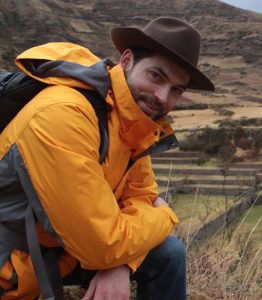 Philip Tinker joined the Ann Arbor office of Kanji & Katzen in 2013, and transferred to the firm’s Seattle office in 2016. Philip is an enrolled member of the Osage Nation. He can be contacted at ptinker@kanjikatzen.com.**
Philip Tinker joined the Ann Arbor office of Kanji & Katzen in 2013, and transferred to the firm’s Seattle office in 2016. Philip is an enrolled member of the Osage Nation. He can be contacted at ptinker@kanjikatzen.com.**
Education: Philip graduated from Trinity University in 2003, with a B.A. in philosophy, where he was a National Merit Scholarship Finalist. He received his J.D. in 2011 from The University of Tulsa College of Law, finishing 3rd in his class of 125 students. Philip was the Articles Research Editor and Symposium Coordinator for the Tulsa Law Review, President of the Tulsa chapter of the Native American Law Students Association, and received the Order of the Curule Chair, the highest academic honor bestowed by the University of Tulsa College of Law. He was also recognized with the Oklahoma Bar Association’s Outstanding Law School Senior Student Award.
Prior Experience: Before joining Kanji & Katzen, Philip served for two years as a law clerk to Chief Judge William J. Riley of the United States Court of Appeals for the Eighth Circuit. While in law school, Philip also participated in the Udall Foundation Native American Congressional Internship Program at the White House Council on Environmental Quality and in the United States Justice Department Summer Law Internship Program at the Office of Civil Rights, where he worked on Native American policy issues.
Areas of Concentration: Since joining the firm in 2013, Philip has played a key role in its appellate and Supreme Court practice. Keenly interested in matters involving inherent tribal sovereignty, jurisdiction, and powers of government, Philip has helped the firm represent its clients’ interests in the following matters:
-
-
- Murphy v. Royal (2017), in which the Tenth Circuit Court of Appeals recognized that the Muscogee (Creek) Nation’s 1866 reservation boundaries remained intact, notwithstanding the allotment of the tribal land base and the widespread, erroneous belief that the Nation’s sovereignty over its reservation had long-since been eroded by the forces of history.
- Kelsey v. Pope (2016), in which the Sixth Circuit Court of Appeals upheld the Little River Band of Ottawa Indians’ jurisdiction to criminally prosecute a tribal member for unlawful conduct (sexual assault of a tribal employee) occurring outside of the boundaries of the Band’s formally recognized Indian Country.
- Dollar General Corp. v. Mississippi Band of Choctaw Indians (2015), in which an evenly divided United States Supreme Court upheld a tribal court’s jurisdiction over a civil tort suit (workplace sexual assault of a minor) brought by a tribal member against a non-Indian corporation operating on tribal trust lands.
- CACGEC v. Chaudhuri (2015), in which the Second Circuit Court of Appeals upheld the Seneca Nation of Indians’ authority to conduct gaming activities on lands owned by the Nation in restricted fee status.
- The Tulalip Tribes and the Consolidated Borough of Quil Ceda Village v. Washington State Department of Revenue (W.D. Wash. 2015), concerning whether inherent tribal sovereignty or federal Indian law principles preempt state and local taxation of economic activity taking place within a tribally chartered municipality.
- Michigan v. Bay Mills Indian Community (2014), in which the United States Supreme Court upheld the doctrine of tribal sovereign immunity in the context of a gaming dispute brought by a State government.
-
Community Service and Personal Interests: Philip has been an active participant in grassroots, student-led efforts to increase cultural awareness and preserve traditional practices amongst Native American students, scholars, activists, and the broader community through education, ceremony, and community events. He supports inherent tribal sovereign rights and the civil and cultural rights of Native peoples through pro bono advocacy, scholarship, public speaking, and counseling tribal leaders and communities.
Philip is an enrolled member of the Osage Nation, and a regular participant in ceremonial and traditional activities with his Osage relatives and other Indigenous and Native groups throughout the American continents. He is committed to advocating for the inherent sovereign, civil, and cultural rights of Native peoples through his work with the firm as well as through pro bono advocacy, scholarship, public speaking, and counseling of tribal leaders and communities.
Philip is an avid bicyclist, and enjoys hiking, climbing, and exploring the natural world.
Bar Memberships:
- State of Nebraska
- State of Michigan
- State of Washington
- Osage Nation
Publications and Lectures:
- Reflections on McGirt v. Oklahoma: A Case Team Perspective, 56 Tulsa L. Rev. 387 (2021) (with Riyaz Kanji and David Giampetroni).
- Is Oklahoma Still Indian Country? Reservation Disestablishment in Murphy v. Sirmons and Osage Nation v. Irby, 9 Dartmouth L.J. 120 (2011).
- In Search of a Civil Solution: Tribal Authority to Regulate Non-Member Conduct in Indian Country, 50 Tulsa Law Review 193 (2014).
Philip is a regular presenter at the Tribal In-House Counsel Association annual conference in Lansing, Michigan, as well as Indian law conferences, CLEs, and law school seminars.
**When sending an e-mail before an attorney-client relationship has been established, please do not include any confidential, secret or otherwise sensitive information. Unsolicited e-mails do not create an attorney-client relationship, and confidential or secret information included in such e-mails cannot be protected from disclosure.